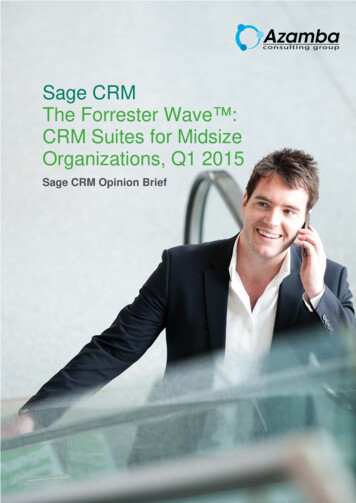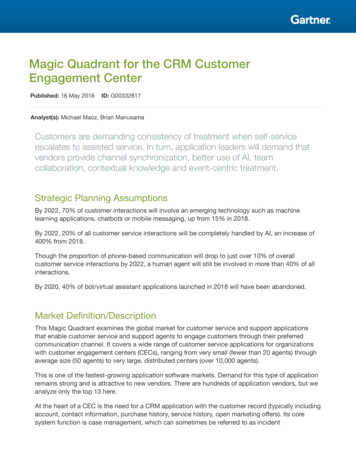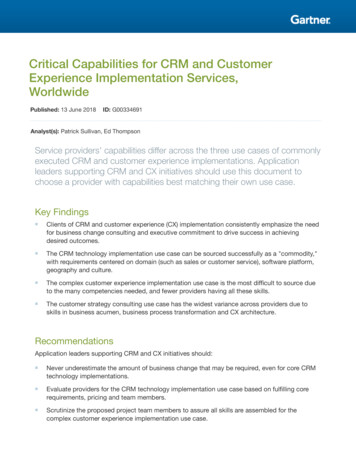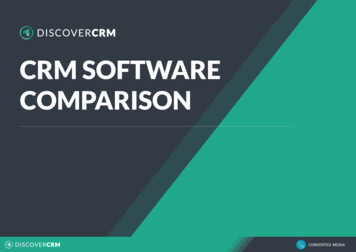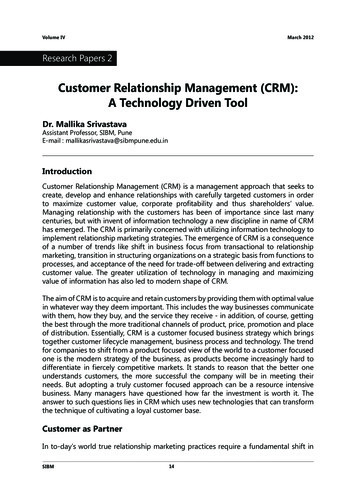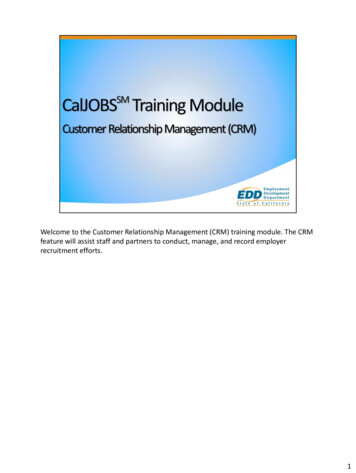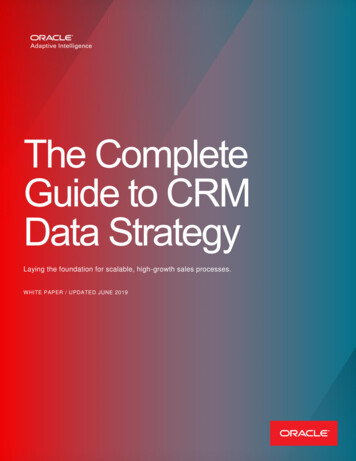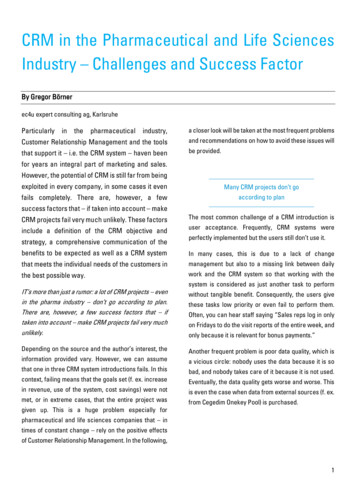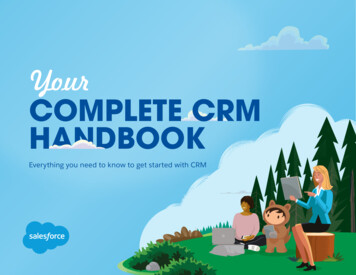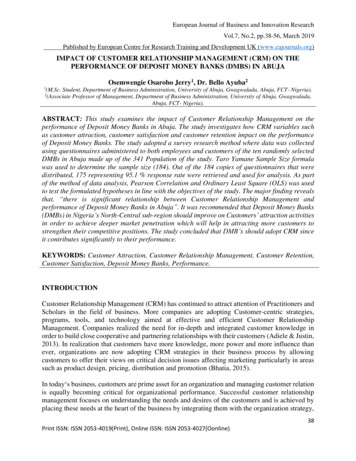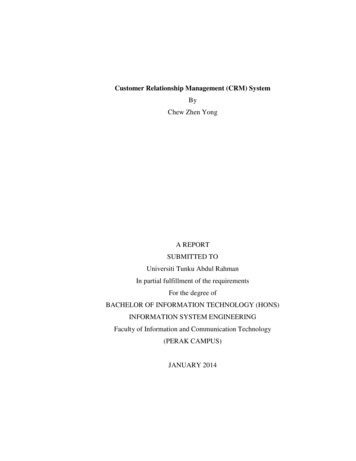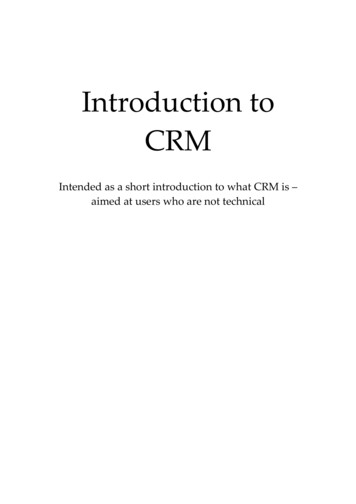
Transcription
Introduction toCRMIntended as a short introduction to what CRM is –aimed at users who are not technical
SalesAgility.comFundamentals of CRMFUNDAMENTALS. 3WHAT IS CRM?. 3YOUR CRM. 5ISSUES OF IMPORTANCE. 5DISCIPLINE 1 - INFORMATION STORAGE.5DISCIPLINE 2 - THE RIGHT INFORMATION.7DISCIPLINE 3 - CRM IS A HABIT. 8Page 2 of 8
SalesAgility.comFundamentals of CRMFundamentalsWhat is CRM?CRM is short for Customer Relationship Management. There are hundredsof books, thousands of learned academic papers and scores of Websitesdedicated to the subject of CRM.Essentially, CRM aims to put your customers at the centre of the informationflow of your company.In a typical company, it is not unusual to have to following scenario:In short, the company or organisation is very rich in information aboutcustomers. It knows lots about them. But the information is not shared. It’sonly available to specific job functions.If a sales person wants to know about what issues are outstanding withcustomer service for a particular customer, then they have to make contactwith the holders of that information and wait for a response. If thesalesperson is chasing the information in response to a question from thecustomer, then the customer also has to wait.So, although many companies are information rich, the information iscompartmentalised. It is not corporate knowledge and the ability to accessinformation and to deliver it rapidly to customers is low - High qualitycustomer service is compromised.Page 3 of 8
SalesAgility.comFundamentals of CRMIn a customer focused company, the information flow and the ability to accessinformation is very different:CRM is an application that enables companies to make the move towardsbeing a customer centred organisation by putting the customer at the centre ofall the information that relates to them and allowing authorised people withinthe organisation to access the information.In a customer centred organisation, salespeople would have access to all theinformation that affects their relationship with their customer. Theconversations, the emails, the complaints, the complaint resolutions, all theinformation that had been sent to the customer, who else in the company thecustomer had spoken to everything that affects their ability to service thecustomer and sell more product or services to them.Customers of a customer centred organisation feel more valued. Theirrequests are dealt with more rapidly and accurately because all theinformation required to service the request is in one place. Customer centredorganisations may have a higher customer retention rates than competitorsorganised along traditional lines because of this.Page 4 of 8
SalesAgility.comFundamentals of CRMYour CRMYour CRM application is called SugarCRM. It is written using Internetcomputer technologies. This means that to use it, you enter a Website addressinto your browser in the same way that you would if you were accessingGoogle, Yahoo or any other Website.The address that you enter to access your CRM is www.xyzwidgets.com.Issues of ImportanceThere are a number of issues of fundamental importance to the success of aCRM application. We will explore all of these in the following pages. In noparticular order, the primary issues are:1. Discipline2. Discipline3. DisciplineDiscipline 1 - Information StorageAll the information on your CRM system is contained in one big store called adatabase. The CRM database is capable of storing details of emails,conversations, quotations, customer names, addresses, telephone numbersand contact personnel for all your customers.It is like having a gigantic filing cabinet.Page 5 of 8
SalesAgility.comFundamentals of CRMA database is like a filing cabinetEasy to find informationIf you store information in astructured and orderly way, thenretrieving information will berelatively easy.Hard to find informationIf you don’t put the informationwhere it belongs, it will becomeincreasingly hard to find.Discipline 1Put information in the right place – ALWAYS.ALWAYS – put the information in the right place. If you deal with onehundred people at XYZ Widgets and you stored all the information about allthe quotations for each person under the general heading of XYZ Widgets,finding any information would become very difficult.If however you created a main file for XYZ Widgets, and a subsidiary folderfor each person at XYZ Widgets and you stored quotations in the separate filefor each person at XYZ Widgets, finding quotations would be much easier.That means if you did a quotation for John Smithers of XYZ Widgets, you canfile the information in one of two places:In the XYZ Widgets file . orIn the John Smithers folder of the XYZ Widgets file Page 6 of 8
SalesAgility.comFundamentals of CRMDiscipline 2 - The Right InformationYour CRM system is a place for storing all the customer related information.There will be a temptation to record everything customer related in thedatabase. Resist the temptation.If you have received an email from a customer with “The 100 best blondejokes” – PLEASE DON’T store it in the CRM system.There is no hard and fast rule. However, common sense ought to tell you thatanything of commercial relevance to your company should be stored. Thisincludes emails with regard to purchases, contracts, negotiations, commercialinformation should be stored. Quotations should be stored. Details of relevantconversations should be stored. Letters to customers should be stored.Anything that adds value to the customer relationship.Legal NoticeDO NOT record information that is of dubious legality about your customeror competitor. There have been cases in the recent past where organisationshave been successfully sued for sending internal emails that containedquestionable information about a competitor. There is little reason to believethat this could not be extended to the CRM system.Page 7 of 8
SalesAgility.comFundamentals of CRMDiscipline 3 - CRM is a habitMake your CRM system a central part of your working life and you will gettremendous value from it.Make your CRM system an incidental part of your working life and watchyour CRM-friendly colleagues make more sales, earn more commission andget faster promotion. Knowledge is power and CRM is a hugely powerfulcorporate knowledge system . Use it or lose it.Six good habits of effective CRM users1When you are at your desk, or are otherwise connected to the Internet,ALWAYS have the CRM application open.2Record information when it happens or as soon as possibleafterwards. DO NOT write everything down on bits of paper and tryto update the system at the end of the week.3Use the CRM system to record all your planned activities – if you justtold John Smithers that you would call him at three-o-clock in threeweeks time – record it on the CRM system – it, in turn, will remindyou to call John Smithers on the right day at the right time.4Use the CRM to plan your activities – at the start of the working dayand the working week, look through the CRM system for all yourmeetings, for all the calls you have to make, for all the reports youhave to prepare. You’ll be impressed by how much more organisedand focused you can become.5If you are in sales – pay particular attention to the pipeline . It willalways tell you where to focus for gain.6There is no such thing as too much detail – i.e. when you enter a saleslead – record as much relevant information as possible. Where did thesales lead come from? If you learn to record the smaller items such asthis, you will build up a picture about how and where you get yourbest business from. Is it from exhibitions, cold calls, customerreferrals? absolutely vital information that will help you sell more.Page 8 of 8
SalesAgility.com Fundamentals of CRM In a customer focused company, the information flow and the ability to access information is very different: CRM is an application that enables companies to make the move towards being a customer centred organisation by putting the customer at the centre of
